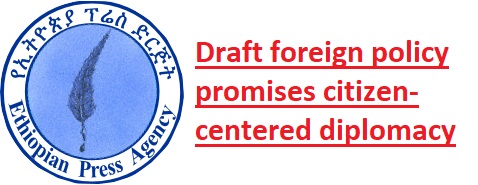
A foreign relations policy document which is in its draft stage has attached increasing attention to citizen-centered diplomacy, it was learned. It as well recognizes Ethiopians living overseas as part and parcel of the national foreign relations. The current Foreign Affairs and National Security Policy and Strategy has paid scant attention to Ethiopians and descendants of Ethiopians’ living overseas, critics say.
But the all-round contribution of the community living oversees to the country has grown by leaps and bounds, many argue. By doing so, it envisages to making the citizens and foreign nationals of Ethiopian origin key participants in areas like investment, trade, tourism, education, science as well as technology transfer.
Meanwhile, politicians, diplomats, and scholars have been scrutinizing the draft foreign policy document, also aimed at better supporting Ethiopia for catching up with current regional, continental and global developments while properly positioning the country to respond properly to global dynamism. Last Saturday, the Ministry of Foreign Affairs held discussions with stakeholders and enriched the document.
The Policy in effect has been in use beyond its service life, say scholars who participated in the event. Typical examples they frequently mentioned were that the policy does not know the newest African country, South Sudan. Nor the policy is informed about the latest Ethio-Eritrean rapprochements.
Prof. Kassahun Berhanu, a political science scholar from Addis Ababa University, who also participated in drafting the policy, says that the existing policy goes as far as touching upon particular issues. To him, the policy’s details about relations of Ethiopia with each and every country are “unnecessarily”. “Public policy document should not be designed that way.”
Details as such are relevant to guide the operations of foreign affairs and they are solely manuals to the enforcement body, he argues. The existing policy discusses Ethiopia’s relations with Eritrea, Sudan, and Egypt. Other gaps could be after two decades of statelessness, Somalia is now in a relatively stable condition, he said, commenting that the current policy does not take this into consideration. Right-wing nationalists as well are coming to public office internationally. The new policy should take these and other factors into consideration, he adds.
More importantly, the affairs of Ethiopians living overseas and Ethiopian descendants of foreign nationals ought to properly be considered in the new policy, according to him. Amb. Dr. Markos Tekile, Foreign Affairs State Minister, says the draft policy has been designed in a way that embraces latest regional, continental and global developments.
It as well takes into consideration the ongoing reform of the country. Regional integration and economic diplomacy are, for instance, priorities attached with the draft document, according to him. Also, it is designed to ensure the safety of Ethiopians overseas, not to mention its importance to participate and benefit the community. The current policy entered to function in 2002.
The Ethiopian Herald, July 12/2019
BY MISGANAW ASNAKE





